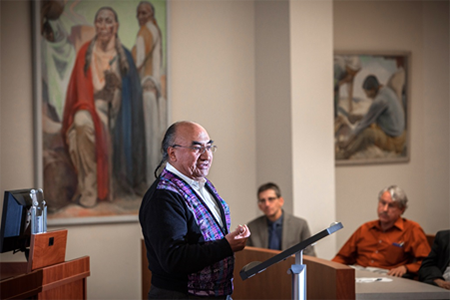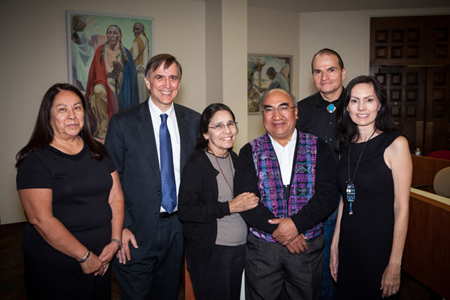Tribal Law Journal Blog Reflects Impact of Talk by Indigenous Expert from UN
February 6, 2015 - Tamara Williams
Francisco Calí Tzay, Chair of the United Nations Committee on the Elimination of Racial Discrimination (CERD), and Lindsay Robertson, Advisor to the CERD Chair on Indigenous Issues, presented “The United Nations and the Rights of Indigenous Peoples” at the UNM School of Law on October 23, 2014. The talk was hosted by the Law and Indigenous Peoples Program.
Now, in keeping with its mission of promoting indigenous self-determination by facilitating discussion of the internal law of the world's indigenous nations, the Tribal Law Journal (TLJ) presents the January 2015 blog, which includes a video of the UN CERD presentation, a video of an interview of Tzay by TLJ staff, and four articles that reflect on the impact of the UN CERD presentation.

Francisco Calí Tzay, Chair of the United Nations Committee on the Elimination of Racial Discrimination (CERD), presented “The United Nations and the Rights of Indigenous Peoples” at the law school last fall.
TLJ staff members Javier Amaya (’16) and EJ John (’16) interviewed Tzay before the talk regarding his views and experience with indigenous internal law at home and at the UN. Tzay spoke about the traditional and customary law practice of his native Mayan tribe in Guatemala and discussed the cultural approach taken by the tribe in community problem-solving. He shared his personal experience of the tense interaction between the national government and the tribal interests and leadership.
In the evening presentation to the Law School and the community, Tzay talked about the history of indigenous activism and how CERD operates in the United Nations system. He also spoke of his long hard journey in the search for human rights for indigenous peoples.

The UNM Law and Indigenous Peoples Program (LIPP) faculty joined law students and community members as part of a standing room only presence to hear President Cali Tzay and Professor Robertson talk about the work of the treaty-monitoring body. The talk was part of the 2 day events surrounding the UNCERD’s visit and sponsored by the LIPP.
Student Perspectives
Amaya (’16), April Wilkinson (’16), Rachel Felix (’16), and Katie McGarvey (’15) write about their impressions of Tzay and the impact of his talk in the January 2015 issue of the TLJ Blog. Below are summaries and/or excerpts of their articles.
 Javier Amaya writes about the Mayan tradition that every baby is born with a Nahual, a protective animal spirit representing the connection between humans and nature. “Depending on the person’s Nahual, the community can decide to increase or decrease his punishment,” Amaya writes. The article provides examples of punishments depending on the nature of the Nahual.
Javier Amaya writes about the Mayan tradition that every baby is born with a Nahual, a protective animal spirit representing the connection between humans and nature. “Depending on the person’s Nahual, the community can decide to increase or decrease his punishment,” Amaya writes. The article provides examples of punishments depending on the nature of the Nahual.
 April Wilkinson summarizes the Mayan legal system, which she indicates is not based on a series of separate areas of law, such as civil, criminal or labor law. It is a legal system based on customary law where a single legal analysis is applied to an issue regardless of whether it is criminal or civil. “Cali Tzay explained that there is historical evidence that Mayans once utilized written codes of law, but these were destroyed during Spanish conquest of the territory that comprises modern day Guatemala,” writes Wilkinson. “Mayans were thereafter forced to adopt an oral custom to perpetuate their customary law.”
April Wilkinson summarizes the Mayan legal system, which she indicates is not based on a series of separate areas of law, such as civil, criminal or labor law. It is a legal system based on customary law where a single legal analysis is applied to an issue regardless of whether it is criminal or civil. “Cali Tzay explained that there is historical evidence that Mayans once utilized written codes of law, but these were destroyed during Spanish conquest of the territory that comprises modern day Guatemala,” writes Wilkinson. “Mayans were thereafter forced to adopt an oral custom to perpetuate their customary law.”
 Rachel Felix reflects on the current practices adopted as “traditional justice” within the Mayan legal system that are not actually derived from traditional Mayan culture. Her article shares examples of negative remnants of “traditional” justice influenced by violence that are not truly representative of traditional aspects of the Mayan legal system; she says they were forced upon the system by years of oppression by the Spanish.
Rachel Felix reflects on the current practices adopted as “traditional justice” within the Mayan legal system that are not actually derived from traditional Mayan culture. Her article shares examples of negative remnants of “traditional” justice influenced by violence that are not truly representative of traditional aspects of the Mayan legal system; she says they were forced upon the system by years of oppression by the Spanish.
 The article by Katie McGarvey discusses the conflicts and tension the Mayan justice system produces in Guatemala and internationally. Within Guatemala, the cultural traditions of the country’s native peoples, including the tradition of Mayan justice, have been looked down upon as primitive and substandard. Nationally and internationally, opponents of the use of public lashings as punishment for certain crimes call it a violation of human rights, condemning it as an inhuman and unjust practice.
The article by Katie McGarvey discusses the conflicts and tension the Mayan justice system produces in Guatemala and internationally. Within Guatemala, the cultural traditions of the country’s native peoples, including the tradition of Mayan justice, have been looked down upon as primitive and substandard. Nationally and internationally, opponents of the use of public lashings as punishment for certain crimes call it a violation of human rights, condemning it as an inhuman and unjust practice.
Tzay Meets with the Pueblo of Jemez
Tzay spent the day after his visit to the law school with leaders and tribal members of the Pueblo of Jemez. He met with the Tribal Governors and officials, and he was the guest of honor at the Tribal Senior Center. Tzay spoke with tribal charter school educators on the importance of tribal languages and discussed the steps indigenous peoples can take toward establishing sovereignty.
